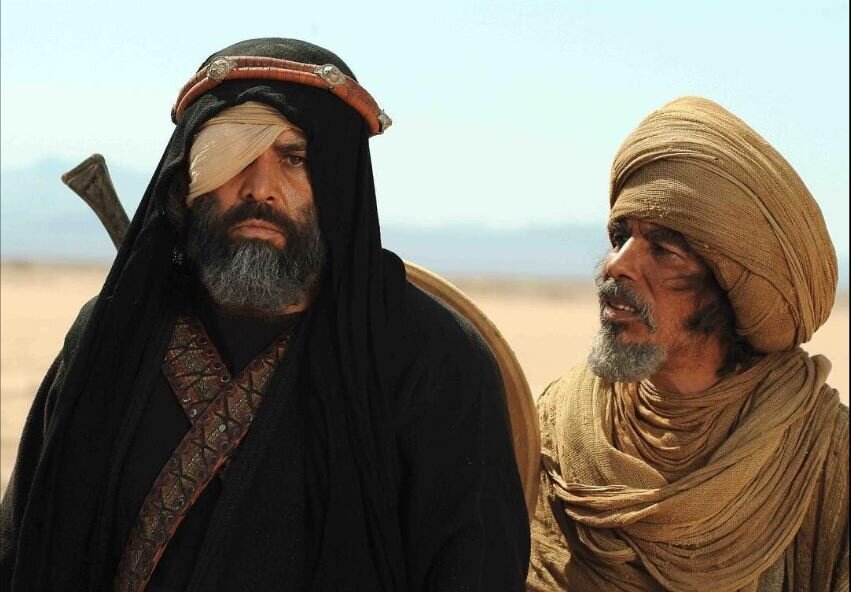Portrayal of Ashura through the lens of Iranian cinema: Part 8

TEHRAN – "Mokhtarnameh" was one of the most successful television productions, garnering a large number of actors.
The actors in this series had a different responsibility compared to other actors who play roles in other visual works.
Most Iranian viewers are already familiar with the characters from the epic tale of "Mokhtarnameh" and have vivid images of these characters in their minds.
This posed a formidable challenge for the actors, as they had to breathe life into these roles while staying true to the Iranian audience's well-established imaginations.
This was necessary to ensure the proper cause and effect in the story and to create the necessary attraction and appeal for the audience to follow the events of the story.
The audience, who has been acquainted with the captivating story of Imam Hussein and Karbala from a young age, is already familiar with the fates of significant characters like Ibn Sa'ad, Shimr, Ibn Ziyad, Hurmala, Maytham al-Tammar, and Muslim ibn Aqil. However, they are now treated to the emergence of believable characters that not only validate their existing perceptions, but also bring fresh dimensions to the vivid image they hold in their minds.
In such circumstances, the role of Mokhtar in this story is much more challenging than playing a lead role in any other story.
Mokhtar in "Mokhtarnameh" not only has to fulfill his own role, but also greatly influences the performance and stability of other actors.
This influence is evident in the scene where Ibn Sa'ad is a guest at Mokhtar's house at the beginning of the story.
In this scene, while Mokhtar is engaged in a simple conversation with his guest, he also has to expose the true nature of the guest through calculated and mocking expressions.
Fariborz Arabnia, in the role of Mokhtar, effectively portrays the deceitful answers of Ibn Sa'ad, played by Mehdi Fakhimzadeh, with mocking smiles, making them apparent to the audience.
It can be said that Arabnia's portrayal of Mokhtar throughout the story is outstanding. Like an invisible thread, he connects the elements of the Mokhtar story together, demonstrating the director's control and guidance over the actor.
Another influential character in "Mokhtarnameh" is Shimr ibn Dhi 'l-Jawshan. Despite not having the apparent violence and cruelty associated with him in people's minds, Mohammad Feili's portrayal of Shimr is close to the reality that brings a character like Shimr to life in history.
Shimr in "Mokhtarnameh" is not a mercenary employed to confront Imam Hussein (AS). Shimr in this series is a completely independent character with decision-making power, acting based on thought and reason in the formation of the Karbala incident and Imam Hussein (AS)’s martyrdom, and he cannot claim to be just following orders.
Shimr in "Mokhtarnameh" is a character who carefully considers all the possibilities and offers solutions for each, which is in stark contrast to the character of Ibn Sa’ad played by Mehdi Fakhimzadeh. While Shimr is a strategist and cunning, Ibn Sa’ad portrays himself as foolish and despicable, which is well-justified based on the performance of these characters in history and is believable for the audience.
This is the result of the excellent performances of the characters and the good direction of the director.
On the other hand, characters like Maytham al-Tammar and Muslim ibn Aqil, played by Parviz Purhosseini and Amin Zendegani, respectively, also contribute to the credibility and strengthening of the opposing characters while being believable and true to their own characters.
The scene of Maytham's confrontation with Ibn Ziyad in Ibn Ziyad's palace is noteworthy, where both actors effectively portray the character of each in the story, making them distinct and believable.
It is as if each actor represents the mental and ideological position for which they have been present in the story.
Maytham, a devout follower of Imam Ali (AS), speaks with a sense of serenity and wisdom, in stark contrast to Ibn Ziyad, who, having been raised within the Umayyad government, displays a disdainful attitude and frequently makes hasty, thoughtless choices.
Purhosseini and Farhad Aslani as Ibn Ziyad perform their roles very effectively and accurately.
Fariba Naderi and Nasrin Moqanlu skillfully portray Mokhtar's wives, each embodying a distinct mindset that prevails in their society during that era.
While one tirelessly supports Mokhtar both in life and beyond, advocating for his beliefs, the other continuously opposes him, adamantly avoiding his line of reasoning.
In general, the aspect of acting can be considered one of the strengths of the "Mokhtarnameh" series in shaping new characters in the minds of the audience, and in this regard, Mirbaqeri has presented an influential and acceptable performance.
Concluded.
Photo: A scene from "Mokhtarnameh" series
ABU/
